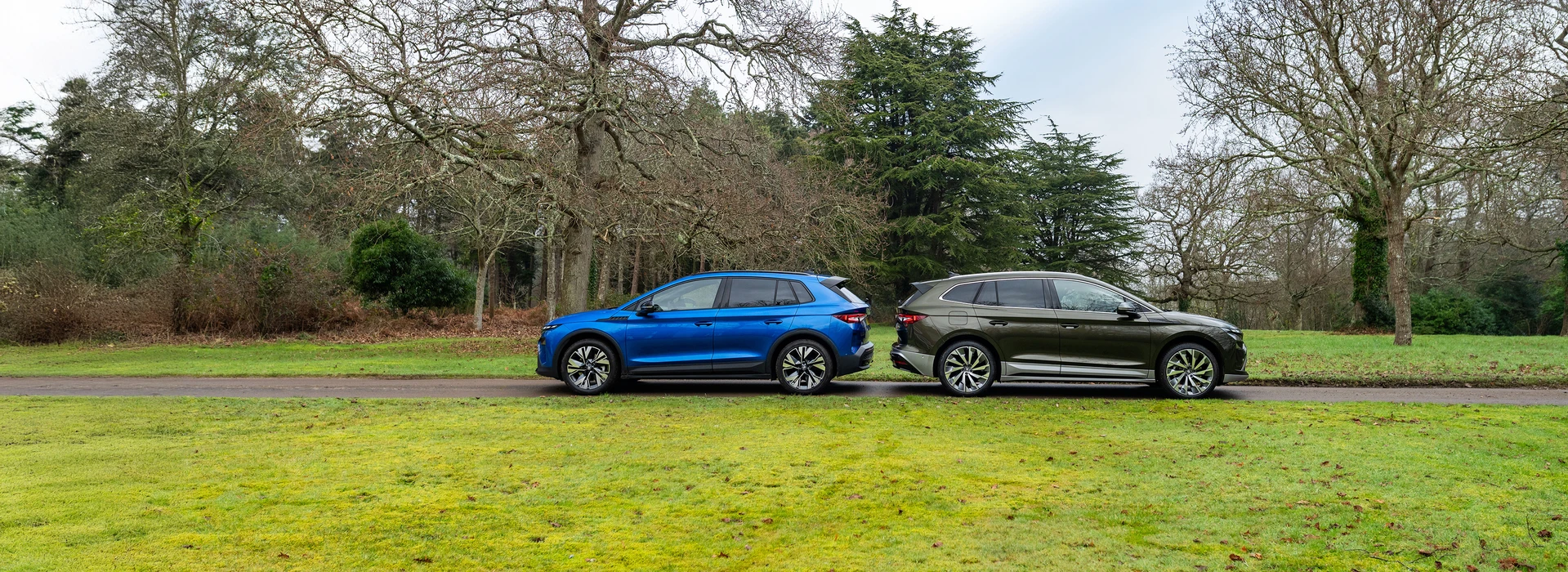Switching your fleet to ultra-low emission vehicles (ULEVs) can pose some questions. So we’ve put together a guide to vehicle range, charging abilities, and compliance for fleet policy and budgets.
Our electric range
There has never been a better time to add Škoda to your fleet. Discover the new, all-electric Elroq and Enyaq now.
Introducing Elroq – the compact all-electric SUV
Launched to rave reviews, the Elroq combines an impressive battery range with a spacious and comfortable ride. Now you can be among the first to get up and go in the new all-electric Elroq.
Enyaq
Our original electric SUV. With stylish looks, state-of-the-art driver assistance and exceptional comfort, the self-assured New Enyaq is ideal for city traffic and long hauls alike.
Enyaq Coupé
The sloping rear body of the New Enyaq Coupé adds an extra dash of elegance to this all-electric SUV’s outstanding versatility and comfort.
Now available as PHEV
Superb Estate
The Superb Estate is a striking executive estate car now available as a hybrid to give you the best of both worlds.
Kodiaq
Style, space, versatility – the Kodiaq 5-or 7-seater SUV has it all, including the option of a Plug-in hybrid version on 5-seat trims.
Benefits for businesses and their drivers
Lower maintenance
Electric vehicles have fewer parts meaning they are easier and cheaper to service.
Impact on environment
We use Lithium-ion batteries that are almost 100% recyclable. Both electric and hybrid vehicles also emit far less CO2 than their petrol equivalents.
Cheaper to run
At just 2 to 3p per mile, electricity is two thirds cheaper than petrol and diesel. Plus Electric vehicles costing less than £40,000 are exempt from Vehicle Excise Duty (VED), also known as the road tax
Lower taxes
Benefit in Kind (BIK) rates on BEV and PHEV models are really low, meaning employee much pay less in Company Car Tax and the company make a significant saving on their Class 1a National Insurance contributions.
For businesses
Helping to improve your corporate social responsibility, EV’s are more ecofriendly than traditional combustion cars, lowering CO2 tail pipe emissions.
For company car drivers
Company car drivers enjoy reductions on their Benefit in Kind (BiK) rates. There are also plenty of local benefits including free parking, free use of bus lanes and exemption from London’s Congestion Charge.
Company car drivers
If your company car is classed as "Benefit in kind" (BIK), you are liable for company car tax. Calculate BIK tax rates and work out the amount of tax payable on any Škoda model using our company car tax calculator.
Additional UK incentives
On top of the OLEV grant, there are plenty of other local and national incentives to make switching to electric cheaper.
The Electric Vehicle Homecharge Scheme (EVHS)
EVHS provides a £350 grant towards the cost of installing a smart charge point at home and an additional £300 support in Scotland.
The Workplace Charging Scheme (WCS)
WCS gives eligible applicants a grant designed to make installing workplace charge-points cheaper.
London Congestion Charge
EVs and PHEVs that emit 75g/km CO2 or less or have a minimum zero-emission range of 20 miles are completely exempt from the Congestion Charge (£11.50 per day) and the new T-Charge (£10 per day).
Local council incentives
Local councils offer electric vehicle drivers perks such as free parking at facilities, free charge points, access to bus lanes and residents’ parking permits at reduced costs.
Charging electric cars
AC charging
DC charging
Home charging
Get in touch
If you have additional questions relating to running electric and hybrid cars in your business, please get in touch with one our team who will be more than happy to help.
